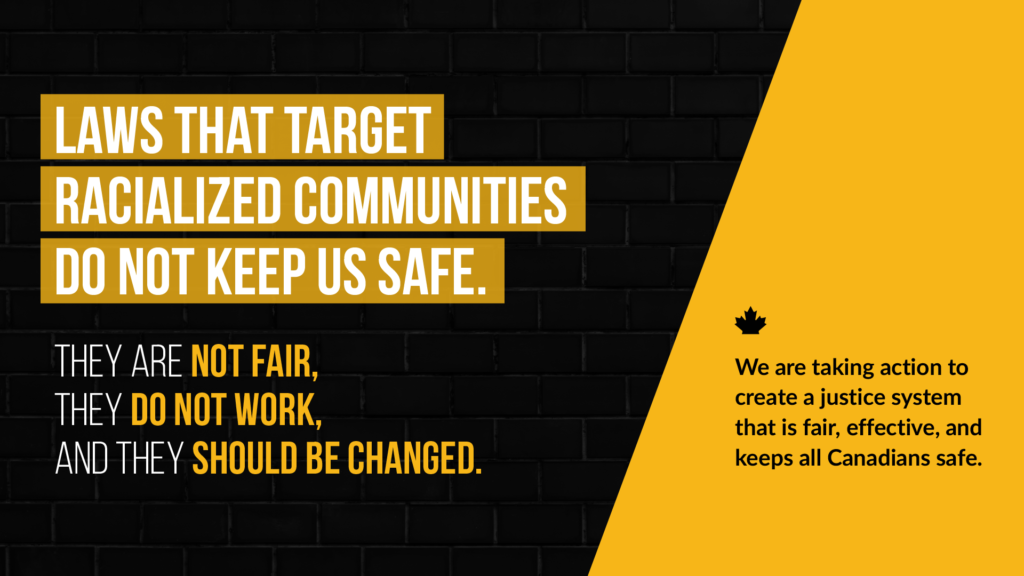
The Government of Canada is committed to ensuring the criminal justice system keeps all Canadians, their families, and communities safe. Recent events have further highlighted the systemic discrimination and disproportionate representation of Indigenous peoples, as well as Black Canadians and members of marginalized communities as offenders and victims in the criminal justice system. Taking steps to address this reality is critical to building a fairer, more effective justice system that keeps us all safe while ensuring serious criminals still face serious punishment.
Today, the Honourable David Lametti, Minister of Justice and Attorney General of Canada, introduced proposed amendments to the Criminal Code and to the Controlled Drugs and Substances Act. These proposed changes would reform sentencing measures for certain offences, including by repealing some of the mandatory minimum penalties of imprisonment (MMPs) that contribute to higher rates of imprisonment and disproportionately affect Indigenous peoples and Black Canadians. Together with Bill C-21, An Act to amend certain Acts and to make certain consequential amendments (firearms), which proposes to increase maximum penalties for certain firearms offences related to gun smuggling and trafficking, this will ensure the courts are better equipped to impose appropriate sentences that keep communities safe. The legislation also increases the availability of conditional sentence orders (CSOs) where appropriate, and encourages greater use of diversion programs.
In keeping with the Government’s public-health centred approach to addiction and the opioid epidemic that has affected families and communities across the country, this Bill proposes specific amendments to the Controlled Drugs and Substances Act. These changes would require police and prosecutors to consider alternatives, including diverting individuals to treatment programs, instead of laying charges or prosecuting individuals for simple drug possession.
The Bill proposes the following specific reforms:
- Repeal MMPs for certain offences to address the disproportionate impact on Indigenous and Black offenders, as well as those struggling with substance use and addiction. This would restore the ability of a judge to impose appropriate sentences that respond to the facts of the case before them, including the individual’s experience with systemic racism and the risk they pose to public safety. This moves away from the one-size-fits-all approach, which has not deterred crime but has resulted in unfair outcomes and a less effective criminal justice system, as well as longer and more complex trials.
- Allow for greater use of CSOs in cases where an offender faces a term of less than two years imprisonment and does not pose a threat to public safety. Under these circumstances, judges would have the option to order that the term be served in the community under strict conditions, including house arrest, curfew, and mandatory counselling or treatment for substance abuse. This change would allow for more effective rehabilitation and reintegration by enabling individuals to maintain their employment, or continue caring for children or family members in need. This approach has been proven to reduce recidivism.
- Require police and prosecutors to consider other measures for simple possession of drugs such as diversion to addiction treatment programs, rather than laying charges or prosecuting individuals for simple possession of an illegal drug. The proposed amendments to the Controlled Drugs and Substances Act reinforce the Government’s commitment to treat substance use a health issue, and address the opioid crisis. It also aligns with calls heard from many in the law enforcement community and local leaders across the country.
These legislative measures complement a number of new investments included in the recent Fall Economic Statement. This includes funding for community organizations and programs that support at-risk youth, provide alternatives to criminal charges where appropriate, and help address inequities faced by Indigenous peoples, Black Canadians and other racialized individuals in the justice system. These investments will notably support Community Justice Centres, Gladue reporting and Impact of Race and Culture Assessments.
This package of reforms represents one part of the Government’s broader efforts to root out systemic racism throughout Canadian society and foster a safer and fairer future for all Canadians.
Quotes:
“The reforms we are introducing are critical to addressing systemic racism and discrimination in the justice system while keeping Canadians safe. We are turning the page on failed approaches which have disproportionately hurt Indigenous peoples, Black Canadians and marginalized communities. They have also left our communities less safe and created a justice system that is less fair for all Canadians. Taken together with other efforts across government, this suite of measures represents an important step forward in the fight to root out systemic racism and ensure a more effective justice system for all.”
The Honourable David Lametti, P.C., Q.C., M.P.
Minister of Justice and Attorney General of Canada
“We know that mandatory provisions can result in sentences that are not proportional to all the circumstances of the offence, and have resulted in disparate, unjust outcomes for racialized and Indigenous people. Sentencing options that include diversion, treatment, rehabilitation and reintegration back into community produce better outcomes and reduce disproportionate incarceration. For serious and violent offences, incarceration is still necessary to protect society and that is why we would increase maximum penalties for serious firearm offences.”
The Honourable Bill Blair
Minister of Public Safety and Emergency Preparedness
“Our government recognizes the very real issue of systemic racism in our country, and around the world. After years of failed policies, we are taking decisive action to address the over-representation of Indigenous Peoples, Black Canadians and other racialized groups in the criminal justice system. We will not turn a blind eye. We will continue to work to build a better, more effective, and fairer justice system. We will contribute to safer Canadian communities by making crucial investments in evidence-based prevention and diversion measures.”
The Honourable Ahmed Hussen,
Minister of Families, Children and Social Development
“Our Government is committed to addressing systemic racism in all aspects of society, and that includes the criminal justice system. It is unacceptable that Indigenous Peoples, Black Canadians, and underserved communities continue to be overrepresented as offenders and victims in the criminal justice system. The steps announced today will ensure a fairer justice system. As we stand together against all forms of discrimination and racism, we can build a consciously more inclusive Canada.”
The Honourable Bardish Chagger
Minister of Minister of Diversity and Inclusion and Youth
Background:
- The Government is responding to calls for reform from Canadians as well as organizations and commissions, including the Parliamentary Black Caucus, the Truth and Reconciliation Commission of Canada, and the National Inquiry into Missing and Murdered Indigenous Women and Girls.
- Data shows that, between 2007-2008 and 2016-2017, Black and other racialized offenders were more likely to be admitted to federal custody for an offence punishable by an MMP. It also shows that the proportion of Indigenous offenders admitted with an offence punishable by an MMP has significantly increased over the past 10 years. Source: Correctional Service of Canada.
- In 2020, despite representing 5% of the Canadian adult population, Indigenous adults accounted for 30% of federally incarcerated inmates. Sources: Office of the Correctional Investigator, 2018 Corrections and Conditional Release Statistical Overview, Statistics Canada’s Population and Demography Statistics.
- In 2018-2019, Black inmates represented 7.2% of the federal offender population but only 3% of the Canadian population. Sources: Office of the Correctional Investigator, 2018 Corrections and Conditional Release Statistical Overview, Statistics Canada’s Population and Demography Statistics.
- According to the 2012 Canadian Community Health Survey, Canadians with a mental or substance use disorder are nine times more likely to come into contact with police for problems with their emotions, mental health or substance use, and four times more likely to be arrested than Canadians without a mental or substance use disorder.
- These changes would repeal MMPs for 14 of the 67 offences covering a broad range of conduct punishable by MMPs under the current Criminal Code. MMPs for all 6 of the Controlled Drugs and Substances Act offences punishable by an MMP would be repealed.
- Under the current Criminal Code, an offence punishable by an MMP requires that the judge impose a sentence equal to or greater than the minimum term for that offence. This is true even in cases where the court finds that imprisonment is not appropriate under the facts of the case.
- Gladue Principles oblige judges to take into account the background, intergenerational effects of colonialism, such as residential schools, and other systemic factors at sentencing. Gladue reports are prepared by court caseworkers to inform alternatives to imprisonment, which can include Indigenous-based alternatives.
- Impact of Race and Culture Assessments provide information to allow sentencing judges to consider how disadvantages and systemic racism contributed to an individual’s interaction with the criminal justice system.
- Community Justice Centres (CJCs) are an innovative approach for moving justice out of the traditional courtroom, and into a community setting. CJCs bring together justice, health, employment, education and social services to collectively address the root cause of crime, break the cycle of offending, and improve public safety and community well-being.
- The Community Justice Centre pilot project, to which we have committed funding, is already underway at three Indigenous Justice Centres in British Columbia. The Prince Rupert Indigenous Justice Centre, for example, offers a range of services, including legal advice from an on-site lawyer, a referral to Legal Aid, advocacy and help dealing with the Ministry of Children & Family Development, someone who can act as a liaison to the person’s local Band, or a worker to help develop a plan to help them make amends for their crimes in a way that best meets the needs of victims, the community and the offender. The IJC has programs to help people coming out of a correctional institution or penitentiary reintegrate into the community, and serves as a central access point for local services and resources, including information on waitlists and eligibility.
Proposed changes:
Proposed changes to mandatory minimum penalties (MMP) in Bill C-22
- MMPs would be repealed for 14 offences in the Criminal Code.
- All six Controlled Drugs and Substances Act MMPs would be repealed.
What remains
- MMPs would be retained for a number of offences, including:
- murder
- high treason
- sexual offences (including child sexual offences)
- impaired driving offences
- some firearm offences, including firearms offences connected to a criminal organization.
Why make these changes to MMPs
Existing sentencing policies have focused on punishment through imprisonment, and they disproportionately affect Indigenous peoples, as well as Black and marginalized Canadians. MMPs have also resulted in longer and more complex trials and a decrease in guilty pleas, which has compounded the impact for victims, who are more often required to testify.
Addressing over-incarceration rates
These reforms would target MMPs that are associated with the over-incarceration of Indigenous peoples as well as Black and marginalized Canadians. For instance, data shows that:
- Between 2007-2008 and 2016-2017, Indigenous and Black offenders were more likely to be admitted to federal custody for an offence punishable by an MMP. In 2020, despite representing 5% of the Canadian adult population, Indigenous adults accounted for 30% of federally incarcerated inmates. The proportion of Indigenous offenders admitted with an offence punishable by an MMP has almost doubled between 2007-2008 and 2016-2017, from 14% to 26%.
- In 2018-2019, Black inmates represented 7.2% of the federal offender population but only 3% of the Canadian population.
Promoting judicial discretion for sentencing
Repealing certain MMPs will help ensure that a person found guilty of an offence is sentenced appropriately.
Sentencing judges must still impose a sentence that is proportionate to the degree of responsibility of the offender and the seriousness of the offence, taking into account all aggravating and mitigating factors. This includes the risk to public safety. It also includes the individual and their experience with systemic racism.
Repealing MMPs provides sentencing judges with the flexibility to impose just punishments, including terms of imprisonment that are lower or higher than the MMPs that would be repealed.
MMPs that would be repealed under Bill C-22
Criminal Code
The reforms to mandatory minimum penalties being proposed only apply to certain offences, and do not limit the ability of a judge to impose a sentence of imprisonment, particularly where doing so is necessary to protect the safety of the public.
To address the over-incarceration rate of Indigenous peoples, as well as Black and marginalized Canadians, MMPs for the following offences would be repealed:
- Using a firearm or imitation firearm in commission of offence (two separate offences)
- Paragraphs 85(3)(a) and (b): MMPs of 1 year (first offence) and 3 years (second and subsequent offence)
- Possession of firearm or weapon knowing its possession is unauthorized (two separate offences)
- Paragraphs 92(3)(b) and (c): MMP of 1 year (second offence) and 2 years less a day (third and subsequent offence)
- Possession of prohibited or restricted firearm with ammunition
- Paragraphs 95(2)(i) and (ii): MMPs of 3 years (first offence) and 5 years (second and subsequent offence)
- Possession of weapon obtained by commission of offence
- Paragraph 96(2)(a): MMP of 1 year
- Weapons trafficking (excluding firearms and ammunition)
- Subsection 99(3): MMP of 1 year
- Possession for purpose of weapons trafficking (excluding firearms and ammunition)
- Subsection 100(3): MMP of 1 year
- Importing or exporting knowing it is unauthorized
- Subsection 103(2.1): MMP of 1 year
- Discharging firearm with intent
- Paragraph 244(2)(b): MMP of 4 years
- Discharging firearm — recklessness
- Paragraph 244.2(3)(b): MMP of 4 years
- Robbery with a firearm
- Paragraph 344(1)(a.1): MMP of 4 years
- Extortion with a firearm
- Paragraph 346(1.1)(a.1): MMP of 4 years
- Selling, etc., of tobacco products and raw leaf tobacco
- Subparagraphs 121.1 (4)(a)(i),(ii) and (iii): MMPs of 90 days (second offence), MMP of 180 days (third offence) and MMP of 2 years less a day (fourth and subsequent offence)
NOTE: Consistent with the Government’s commitment to address the trafficking and smuggling of firearms in Canada and gang-related violence, MMPs are being maintained in the Criminal Code for the following offences:
- Weapons trafficking
- Subsection 99(2): MMP of 3 years (first offence) or 5 years (subsequent offences)
- Possession for the purpose of weapons trafficking
- Subsection 100(2): MMP of 3 years (first offence) or 5 years (subsequent offences)
- Making automatic firearm
- Subsection 102(2): MMP of 1 year
- Importing or exporting knowing it is unauthorized
- Subsection 103(2): MMP of 3 years (first offence) or 5 years (subsequent offences)
- Causing death by criminal negligence, use of firearm
- Subsection 220(a): MMP of 4 years
- Manslaughter, use of a firearm
- Subsection 236(a): MMP of 4 years
- Attempted murder, use of a firearm
- Paragraph 239(1)(a): MMP of 5 years (first offence) and 7 years (subsequent offences) – where firearm is restricted or prohibited or if any firearm is used and the offence is committed in connection with a criminal organization
- Paragraph 239(1)(a.1): MMP of 4 years in any other case (involving non-restricted firearms)
- Discharging firearm with intent
- Paragraph 244(2)(a): MMP of 5 years (first offence) and 7 year (subsequent offences) where firearm is restricted or prohibited or where the offence is committed in connection with a criminal organization
- Discharging firearm—recklessness
- Paragraph 244.2(3)(a): MMP of 5 years (first offence) and 7 year (subsequent offences) where firearm is restricted or prohibited or where the offence is committed in connection with a criminal organization
- Sexual assault, use of firearm
- Paragraph 272(2)(a): MMP of 5 years (first offence) and 7 years (subsequent offences) – where firearm is restricted or prohibited or if any firearm is used and the offence is committed in connection with a criminal organization
- Paragraph 272(2)(a.1): MMP of 4 years in any other case (involving non-restricted firearms)
- Aggravated sexual assault, use of a firearm
- Paragraph 273(2)(a): MMP of 5 years (first offence) and 7 years (subsequent offences) – where firearm is restricted or prohibited or if any firearm is used and the offence is committed in connection with a criminal organization
- Paragraph 273(2)(a.1): MMP of 4 years in any other case (involving non-restricted firearms)
- Kidnapping, use of a firearm
- Paragraph 279(1.1)(a): MMP of 5 years (first offence) and 7 years (subsequent offences) – where firearm is restricted or prohibited or if any firearm is used and the offence is committed in connection with a criminal organization
- Paragraph 279(1.1)(a.1): MMP of 4 years in any other case (involving non-restricted firearms)
- Hostage taking, use of a firearm
- Paragraph 279.1(2)(a): MMP of 5 years (first offence) and 7 years (subsequent offences) – where firearm is restricted or prohibited or if any firearm is used and the offence is committed in connection with a criminal organization
- Paragraph 279.1(2)(a.1): MMP of 4 years in any other case (involving non-restricted firearms)
- Robbery with firearm
- Paragraph 344(1)(a): MMP of 5 years (first offence) and 7 years (subsequent offences) – where firearm is restricted or prohibited or if any firearm is used and the offence is committed in connection with a criminal organization
- Extortion with a firearm
- Paragraph 346(1.1)(a): MMP of 5 years (first offence) and 7 years (subsequent offences) – where firearm is restricted or prohibited or if any firearm is used and the offence is committed in connection with a criminal organization
Controlled Drugs and Substances Act
To address the over-incarceration rate of Indigenous peoples as well as Black and marginalized Canadians, MMPs for the following offences would be repealed:
- Trafficking or possession for purpose of trafficking (two separate offences)
- Subparagraph 5(3)(a)(i): MMP of 1 year; Subparagraph 5(3)(a)(ii) – MMP of 2 years
- Importing and exporting or possession for the purpose of exporting (two separate offences)
- Paragraph 6(3)(a): MMP of 1 year; Paragraph 6(3)(a.1) – MMP of 2 years
- Production of substance Schedule I or II (two offences)
- Paragraph 7(2)(a): MMP of 3 years and 2 years; Subparagraph 7(2)(a.1)(i) and (ii) – MMPs of 1 year and 18 months
Related product: Mandatory Minimum Penalties Struck Down by the Courts
Related products
- Backgrounder – Bill C-22: Mandatory Minimum Penalties to be repealed
- Backgrounder – Mandatory Minimum Penalties and the Courts
- Backgrounder – Bill C-22: Promoting Health Responses to Simple Drug Possession
- Backgrounder – Addressing Systemic Racism: Fall Economic Statement support for Criminal Justice Reform
Associated links
- A Stronger and More Resilient Canada (Speech from the Throne, September 2020)
- Building a Foundation for Change: Canada’s Anti-Racism Strategy 2019–2022
- Restorative Justice
- Directive from the Director of the Public Prosecution Service of Canada regarding the prosecution of possession of controlled substances contrary to s. 4(1) of the Controlled Drugs and Substances Act
- Fall Economic Statement 2020







